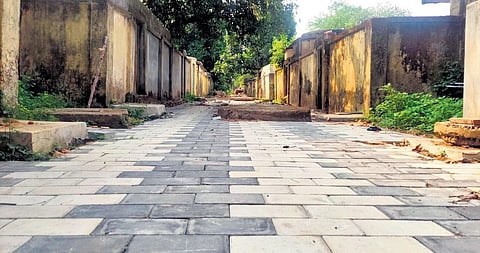Odisha: Pavers disastrous for city life, warn urban experts
BHUBANESWAR: The ongoing paver laying work being carried out in different parts of the state capital will prove disastrous during summer and also be detrimental to groundwater recharge during monsoon, environmentalists have warned.
The temperature in areas covered with heat-absorbing structures has been found to be 3 to 5 degrees more compared to those covered with greenery. Laying of paver blocks in the urban landscape will aggravate the situation during summer and the city will experience excruciating heat conditions, they said.
The Bhubaneswar Municipal Corporation (BMC) should take the heat index of the state capital into consideration before executing the paver laying project along roads and conservancy lanes of residential areas, said environmentalist Jaya Krushna Panigrahi.
The heat index prepared by BMC with the help of Odisha State Disaster Management Authority (OSDMA) has identified at least two dozen wards in the capital city to be vulnerable to severe heatwave.
The land surface temperature (LST) retrieved from Landsat 8 thermal infrared sensor and the GIS analysis has revealed that temperature in parts of ward number 52, 65, 22, 23, 5 and a few other places sometimes reach up to 43 degree Celsius and beyond during summer due to the nature of the land surface as well as rapid urbanisation that radiate more heat.
Panigrahi suggested that crores of rupees spent on laying paver blocks should instead be utilised for the plantation of saplings and laying of grass beds along the roadside and vacant places for enhancing greenery, restoration of water bodies, and effective rainwater harvesting in the city.
Orissa Environmental Society (OES) president Sundara Narayana Patro said the percolation of rainwater into the soil will also get obstructed severely due to the laying of paver blocks. With paver blocks facilitating the percolation of just 5 to 10 per cent of rainwater, environmentalists said the concept that the blocks will help in the percolation of stormwater is unrealistic.
The National Green Tribunal had ordered the authorities of Noida and Greater Noida to stop concretisation of roadside and undertake plantation at open spaces to facilitate rainwater recharge. Similarly,the Delhi High Court had also termed concretisation of trees as the worst kind of human rights abuse.
Panigrahi said following the Delhi HC order, the Delhi Municipal Corporation has de-concretised 5,908 trees in different areas, helping rainwater percolation and air diffusion in soil. “In the light of the order, paver block works should be immediately abandoned,” he suggested.

